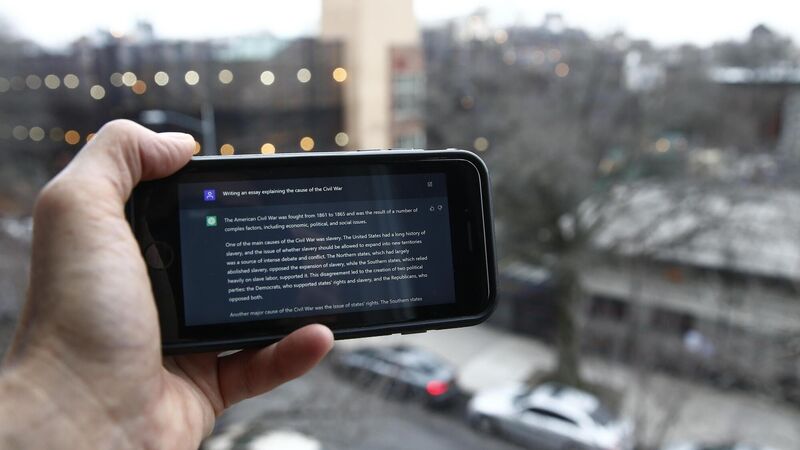Bernard O'Shea: ChatGPT, please be my life-coach

A ChatGPT prompt. Picture: AP Photo/Peter Morgan
"Embrace the new," they say. Well, I did precisely that, embarking on a six-week journey with an artificial intelligence named ChatGPT as my life coach.
Why, you ask? Well, who wouldn't want an AI with an apparent knack for cognitive behavioural therapy guiding them through their unique blend of hopes and fears?
Our digital world teems with AI, offering us weather forecasts, pop trivia, travel times to creche, and even our daily news. But life advice? That's a new frontier! Well, "newish".
The World Health Organization identifies a global shortage of mental health-trained professionals. Consequently, nearly 70% of those requiring help aren't receiving it.
As per Danielle Ellis's 2017 article on news-medical.net, less than half of U.S. adults with mental health issues accessed services, and 75% of depression patients faced treatment barriers.
But what if you could cut all your troubles off at the pass early, and get hindsight and invaluable advice instantly from your phone?
I was taken aback by ChatGPT's practical advice. However, its responses were not influenced by the peculiarities of my character. This is a problem.
Unlike sitting in front of another human, there is no weaving through the ambiguities of your life.
I found out that the more precise and more specific (no matter how embarrassing the point, i.e. "I spend two hours a day on YouTube") the "prompt" or feedback you give, it has to be accurate and precise. This felt like a soulful decluttering.
I had to throw out some preconceived notions of myself to get an answer that could point me in the right direction.
For example, I gave it all the jobs I had to do during the week, household chores, writing work, and kids picking up everything.
It quickly came back with prioritising "paid work" and "childcare" and the time needed to spend on them.
When I looked at how much time I was spending on proposing work, like scripts, etc, that I wasn't getting paid for, I realised that I was constantly underselling my time.
For the first time, I could also analyse how much time I gave existing work. That, too, I also have been massively undervaluing.
I found the quality of my life improving by inches rather than feet.
My procrastination was dwindling, and my patience was increasing.
I happily became a bit of a digital slave to my new life timetable, which it spat out at me to improve my "productivity".
However, I wasn't taking its advice to "wake two hours earlier" too seriously.

By now, ChatGPT, moreover its "Plan for Bernard", had become an integral part of my daily routine.
However, it wasn't all smooth sailing.
Its understanding of emotional complexities—like the kids getting sick or not wanting to do another online skills-based course — left much to be desired.
Still, it was a constant source of unbiased advice and perspective.
It was now like a holiday friend. The first week was great craic. The second week, it was wearing a bit thin.
I began to appreciate the unique value of AI in life coaching.
While it might lack the emotional depth of a human coach, the consistent support offered was more instant and valuable in its own way.
For example, my highly convoluted Bernard planner, which accounted for every clock hour, wouldn't work.
Any human would have told me this but also would have taken great glee in telling me.
But ChatGPT just broke it down into more bite-sized chunks. It will never hug you, but it will always give you an answer.
I realised that those horrible life affirmations you see on office posters — like "Life is dynamic, not static" and "Embracing change leads to growth" — were beginning to make sense.
Jesus, I hate those pictures.
It was clear that while AI has limitations in understanding human emotions, it can provide logical, unbiased advice.
But by now, ChatGPT works on you knowing exactly what you want, and nothing else. The phrase "the more you put in, the more you get out" embodies it.
The fear of Artificial Intelligence shouldn't be what it can do, but what we are willing to tell it to do.





